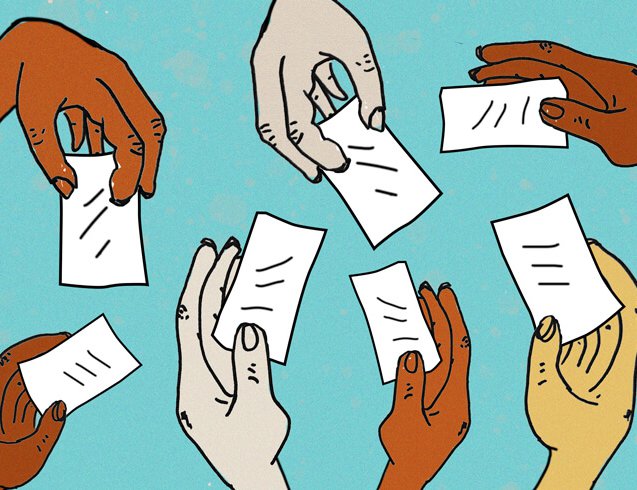
Democracy is committing suicide right in front of our eyes. People have had enough of representative democracy. Our democratic republic no longer reflects the people. When it comes to leadership, we have a significant problem. Money and muscle, nepotism, and corruption are just a few of the difficulties we face. Political parties, like the government, are losing legitimacy. With a quarter of the vote, you can gain power.
Aristotle, the Greek philosopher, believed that drawing lots for offices was more democratic than choosing office holders. Because the outcome of an election is determined by a variety of factors, including the candidates' political clout and financial resources. The primary purpose of democracy is for the state and society to produce fair and comfortable living conditions for the typical person in order to form his moral virtues. How can we do this by electing a leader who has no moral values and simply cares about his own family, group, or party?
The current system will never achieve an absolute majority. As we can see, the third-ranking party is in charge of the government. It is not a question of building a flawless system using lottocracy, but of selecting a model that is comparatively superior than traditional elective democracy. Electoral procedures are usually framed by numerous criticisms, successes, and controversies with which candidates aim to reach the contested position. Lottocracy is not a new concept, but it has a lengthy history. The lottery of offices was important to Athenian democracy and some Renaissance Italian communities such as Venice.
With lottocracy, every citizen has the same chance of being elected. The lottocracy reduces costs, clientelistic practices, and voting polarization while allowing for more representative assemblies. Its members can also deliberate more freely in quest of the finest ideas because they are not burdened by commitments.
The democratic lottery, also known as selection by lot or demarchy. It supposedly depicts the choosing of political officials by lottery from a wide pool or a number of candidates. The lottocracy ensures that all parties interested in holding a political office have the same opportunities and possibilities as the other postulates.
It ensures equality in elections, as opposed to present elections, which provide some person advantages. Lottery winners would be a representative sample of society. It gives elected officials more independence because they are not elected because of political favors or campaign contributions, and they are more focused on the public good. A lottery brings an electoral process to a close. We are all aware of the challenges caused by the current democratic-based system, which come from the internal hierarchical structures of political parties, closed electoral lists, and the election of heads of government and leaders of various powers.
The lottery election procedure in ancient Athens had a distinctive approach. The persons who would fill the position (mainly magistracies) were then picked at random and by lottery in a machine called kleroteria. The magistracies assigned to persons elected in the kleroteria had a year to complete their duties. Furthermore, a key feature of Athenian democracy is that citizens can only exercise magistracy once in their lifetime.
The election has become prohibitively expensive for Nepalese. We can save money by using lottocracy. The only disadvantage of this lottocracy is its lack of competence. This problem has a very simple answer. We must invest extensively in education so that the populace as a whole becomes more skilled in all topics and the winner is not a burden on the nation.
The main source of concern is corruption. A politician is said to be corrupt if he utilizes his position to defend the interests of the most powerful people rather than responding to society's expectations and demands. The easier it is for a leader to make decisions without the approval of the people, the more appealing it is for a lobby to sway him.
Corruption is reduced by frequent transitions of authority. The lottocracy minimizes nepotism and ethnic mutual help is reduced, and representatives' accountability to their fellow humans is non-existent. When chance chooses the new leaders, no one owes anything to anyone. Power-hungry individuals will not be favored. Lottocracy would ensure that representatives were disinterested. The range of individuals' experiences would provide a more accurate representation of society's true challenges. It will prevent politicians from focusing on short-term issues in order to keep their popularity up until the next election. Ticket buying and selling, as well as voting, will be prohibited.
Our court is supposed to provide justice, but it has unfortunately become a recruiting ground for political parties. Those who have access to justice receive it. If justice is administered by lottery, anyone has a 50% chance of receiving it. The ultimate goal is to seek changes to the current system, not to design the perfect political organization. We have tried many different political systems over the last 50 years, and none of them have been able to improve our society. The lottocracy may be the finest form of democracy for Nepal.

Deepak Raj Joshi
(The author is a lecturer and IT consultant. He also writes fiction under the name of Kapeed Joshi. He can be reached by email at info@dipakjoshi.com.np.)
- Participatory Democracy
- Dec 07, 2023
- Rise Of Populism Boon Or A Bane
- Aug 13, 2023
- The Collapse Of Confidence And The Rise Of RSP
- May 17, 2023
- Political Rot With Social Deterioration
- Jan 19, 2023
- Liquid Democracy
- Nov 23, 2021
















